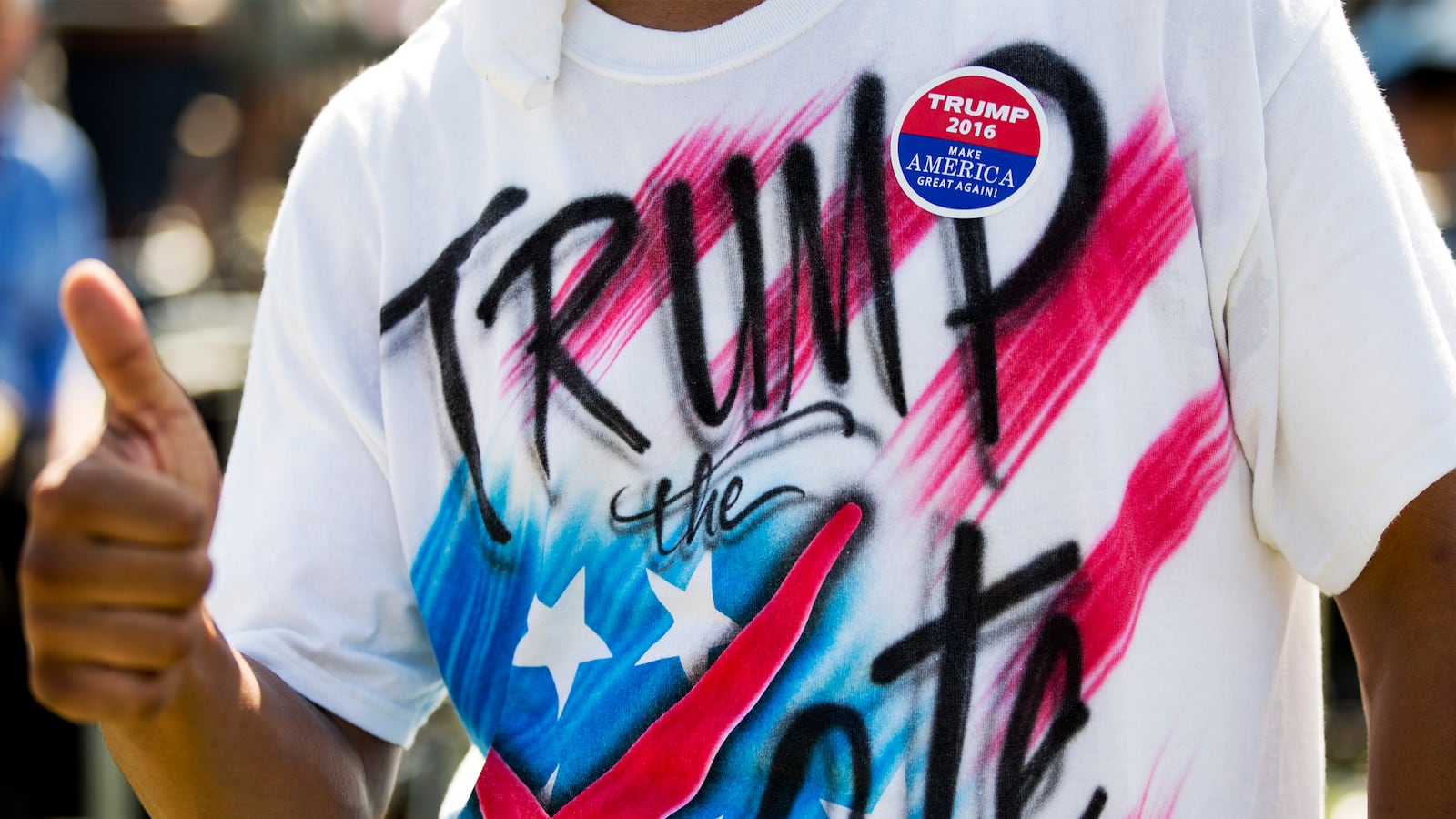Last week, Survey USA released an eye-catching poll showing how Donald Trump would fare in head-to-head matchups against potential Democratic nominees Hillary Clinton, Bernie Sanders, Joe Biden, and Al Gore. The most shocking result was not that he beat all four of the candidates. What made everyone’s jaw hit the floor is that he received more than 20 percent support among African-American voters in every matchup.
Normally, the GOP would be ecstatic about a Republican garnering this much support from the much sought-after African American voter base, but Trump’s success as a divisive, anti-establishment candidate has resulted in most onlookers responding with disbelief and/or alarm.
How does a candidate who holds political rallies in Alabama with supporters screaming “white power” and has been endorsed by the neo-Nazi website The Daily Stormer receive over 20 percent support of African-American voters in a national poll?
And better yet, why isn’t Ben Carson, the only African-American presidential candidate—who according to a recent Monmouth poll is tied with Trump in Iowa with 23 percent, receiving a similar level of support among African-American voters?
“Donald Trump has a certain swagger about him that I think registers with people. Especially if he is talking about trying to make government work for the people,” said Donald E. Scoggins, a lifelong Republican and president of the Republicans for Black Empowerment. “I think Trump’s support is primarily personality driven.”
Trump has already built name recognition and a culture of personality that other GOP candidates could only dream of establishing. Jeb Bush is the only candidate with a similar level of name recognition, but it is much easier to defend the legitimacy of skyscrapers, casinos, golf courses, and television shows that bear your name than the divergent and varying successes of the policies of the two previous Bush presidencies.
Thus far Trump’s personality, business credentials, and entertainment factor have brought more unanticipated voters into the fold. Who would have ever thought that Diamond and Silk of webesisters.com could potentially vote Republican, or that they would launch a YouTube channel defending Trump and lambasting all those who criticize him, including Fox News and the GOP.
Some people argue that roughly one-third of black Americans self-identify as conservative, yet still they rarely vote Republican. For example, plenty of black churches espouse beliefs that could be categorized as socially conservative, and align more with the Republican agenda, but the vast majority of these congregations vote Democratic.
To the majority of black voters, the Republican Party seems out of touch and unaware of the issues that are important to the black community, and voters rarely vote for candidates they cannot relate to. To a certain extent personality comes first, and policy comes second. Voters need to like you and want to listen to you before they can form an opinion on your policies.
The GOP rarely presents candidates who appeal to African Americans. Mitt Romney’s 2012 presidential campaign, when he only won 6 percent of the African-American vote and was consistently called out of touch and aloof, speaks to the significance of this problem.
Carson also shows how difficult it is for the GOP establishment to relate to black voters. Through his success as a surgeon and author, Carson has been known throughout the black community and specifically black churches for decades. African Americans are not only willing to listen to him, they already have, but as a candidate his appeal has fallen flat. His criticisms of Black Lives Matter and the protests in Ferguson and Baltimore following the deaths of Michael Brown and Freddie Gray has made him appear out of touch with the black community, including conservative blacks.
Carson’s belief that racism and poverty can be eradicated through individual acts and not structural change resonates with white conservatives, but is loathed by black Americans. The BLM movement aims to tackle systemic and institutional racism to improve the lives of black Americans. The civil rights movement of the 1960s was about confronting and breaking down the racist and institutional structures in America that prevented black advancement.
He expresses a belief in individual liberty and freedom as a universally uplifting force and this resonates with Republican voters. Black voters, even the conservative ones, more closely relate to collective, community-based initiatives that tackle large problems that negatively impact the entire community. Carson most certainly is apart from this community.
Trump on the other hand is a community of one. He joins and departs established groups or businesses depending on the quality of the deal he can strike, and he has no problem attacking or demonizing certain entities for his own personal or political gain. Pitting groups against each other and fear mongering is a commonly used tactic for creating a support base, which you can leverage to pursue a business, personal, or political agenda, and Trump has masterfully executed this tactic—to the disbelief of onlookers.
His demonizing of immigrants is abhorrent, and his “plan” to deport the estimated 11-12 million undocumented immigrants would be disastrous, but his fear mongering and us-vs.-them tactics have not only created a large supporter base among conservative white Americans, but also black Americans who have been disproportionately hit by the economic downturn.
“Illegal immigration is resonating with black Americans because Trump’s saying that the kind of jobs that these people are taking are maybe the ones that black Americans would have gotten,” said Scoggins.
Scoggins is open to the possibility of voting for Trump because he feels “that the Republican Party and the country needs to be shaken up, and the cobwebs need to be cleared out.” But he also believes that Trump’s presentation needs to be “less toxic from a racial standpoint” to secure his vote.
Trump’s rhetoric can attract black supporters because his dehumanizing language is not directed toward them, and is masked by the false promise of economic opportunity and national unity.
Trump’s present success derives from his cult of personality, his anti-establishment bravado that only being a billionaire can provide, and the unifying force of fear mongering. As his campaign progresses he is going to have to speak to the issues that matter most to the black community if he wants to retain their support. Addressing the white supremacist/separatist faction of his supporter base will be only one of many questions that will need to be answered.
Trump has already surmounted the first obstacle for obtaining more black support for GOP candidates. Yet if he fails to relate to his surprisingly vociferous and large amount of African-American supporters on policy issues then he may lose them, and no one should expect these voters to shift their support to another GOP candidate. Most GOP candidates, even the African-American one, are still too out of touch with black voters to earn their support.





